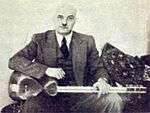Ali-Naqi Vaziri
| Ali-Naqi Vaziri علینقی وزيری | |
|---|---|
 | |
| Background information | |
| Birth name | Ali Naqi Vaziri |
| Also known as | Colonel |
| Born |
September , 1887 Tehran, Persia |
| Died |
September 9, 1979 (aged 91) Tehran, Persia/Iran |
| Genres | Persian music |
| Occupation(s) |
player of the tar composer musicologist |
| Years active | 1925–1979 |
Ali-Naqi Vaziri, also transcribed as Ali Naghi Vaziri (Persian: علی نقی وزیری)
(1887 in Tehran, Persia – September 9, 1979) was a composer, thinker and a celebrated player of the tar. He is considered as a revolutionary icon in the history of 20th century Persian music.
Ali-Naqi Vasiri (also known as Colonel Vaziri) is one of the seven children of Musa Khan Vaziri (a prominent official in the Persian Cossack Brigade) and Bibi Khatoon Astarabadi, a notable Iranian writer, satirist and one of the pioneering figures in the women's movement of Iran; her book Ma'ayeb al-Rejal (Failings of Men, also translated as Vices of Men) is considered by some as the first declaration of women's rights in the modern history of Iran. The celebrated artistic painter Hassan Ali Khan Vaziri is Ali-Naqi's brother.
Ali-Naqi Vaziri was a master of Persian classical music so that he was able to play the tar in a style very reminiscent of that of Mirza Abdollah. He always looked for new dimensions and perspectives in musical expression, and by doing so he revolutionized the style of playing the tar. He was the first to transcribe the classical radif of the Persian music.
Vaziri for years was the director of Tehran Conservatory of Music and a professor at the University of Tehran.
Works
Vaziri works are written for tar, voice and orchestra, orchestra, etc. He has composed patriotic anthems as well. "Dokhtarak-e Joolideh" (Unkempt Girl) and "Bandbaaz" (Aerialist) - both for tar solo - are among his most famous works.
References
- Khaleghi, R., Sargozasht e Musighi e Iran, Ferdowsi Publication, 1955, (in Persian)
- Ella Zonis, Contemporary Art Music in Persia, The Musical Quarterly, Vol. 51, No. 4, pp. 636–648 (1965). JSTOR
- Hormoz Farhat, The Dastgāh Concept in Persian Music (Cambridge University Press, 1990). ISBN 0-521-30542-X, ISBN 0-521-54206-5 (first paperback edition, 2004). For a review of this book see: Stephen Blum, Ethnomusicology, Vol. 36, No. 3, Special Issue: Music and the Public Interest, pp. 422–425 (1992). JSTOR
- Laudan Nooshin, in The New Grove Dictionary of Music and Musicians, edited by Stanley Sadie, second edition (Macmillan, London, 2001). ISBN 1-56159-239-0. (Oxford University Press, 2001). ISBN 0-19-517067-9.
External links
| Wikimedia Commons has media related to Ali-Naqi Vaziri. |
- Ali-Naqi Vaziri (In English) Encyclopedia Iranica